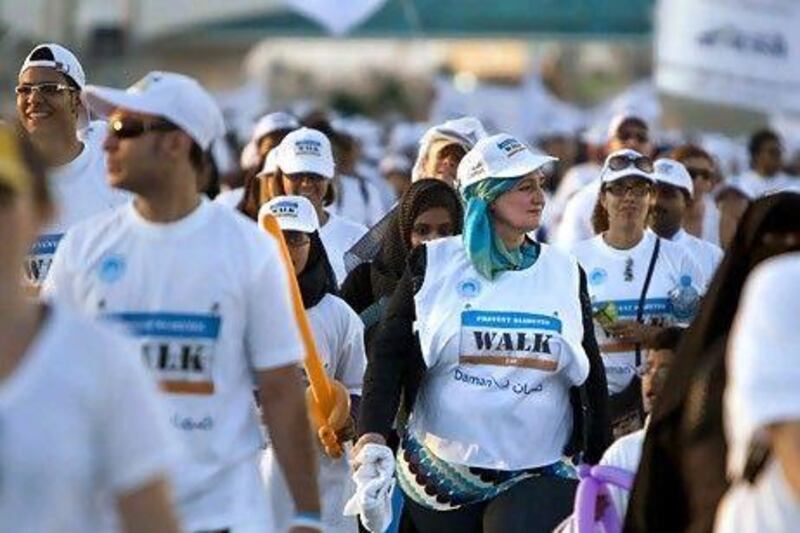As afternoon rolled into evening on Monday, staff at the St Regis Hotel Saadiyat Island were finalising preparations for the glittering Abu Dhabi Restaurant Awards. It promised to be an evening that celebrated decadent eating.
It was somewhat ironic then that on the other side of the hotel ballroom, 20 top business leaders from the Emirates were ending a day of discussions about how to address the UAE's top public health problem caused, in part, by overeating and unhealthy eating: diabetes.
Indeed, it is becoming increasingly clear that the disease is not only taking its toll on the health of the nation, but it is also putting the country's economic well-being at risk. Businesses have a role to play in addressing this issue.
It is no secret that the UAE has the highest prevalence of diabetes in the Middle East and North Africa region, affecting 18.7 per cent of the adult population, according to the International Diabetes Federation. But new analysis by the consultancy Booz Allen Hamilton has also revealed the burden the disease is placing on the nation's healthcare system.
Data collected by the company shows that diabetes is a factor in 31 per cent of deaths in the UAE. Last year, the total cost of diabetes in the UAE was US$6.6 billion (Dh24.24bn), or 1.8 per cent of GDP, higher than any other GCC country. As the problem worsens, costs will skyrocket, the consultancy said.
But how to tackle the problem?
A separate study conducted by Booz earlier this year indicates that while a large proportion of Emiratis are aware of what diabetes is and that they are in danger of developing the disease, there is a lack of understanding about prevention.
"These findings point to key opportunities to launch efforts that use a mix of effective messengers to address the misconceptions about effective diabetes prevention and control," the report said. To this end, Booz invited the 20 executives, representing various multinational organisations and academic institutions, to discuss what changes can be made in the workplace to address diabetes. Participating groups included Rotana, Nestlé, Lockheed Martin and Georgetown University.
"An insight that the group came to is that [individual companies] can make some incremental differences on [their] own within a certain segment or industry. But to make a dramatic change you really have dialogue across multiple platforms," says Grant McLaughlin, the vice president at Booz and the main author of the report.
Dr Sami Alom, the chief strategy officer at Al Noor Hospitals Group, who was at the meeting, agrees.
"For us, it's really important we treat diabetes and we are looking at how we can expand our public services," he says.
"The purpose of us participating in the forum is to see what role we can play in solving this problem. And what's interesting to see is we are not the only ones that have to play a role.
"Employers, nutrition companies, exercise companies, urban planners, insurance companies all together have to tackle this problem because it's too big for just one player." Al Noor Hospitals provides an in-house nutritionist for all its employees. It also runs an awareness campaign for nutrition and exercise, and organises a sports day.
Mr McLaughlin believes that while many UAE companies are concerned about diabetes, there is much more to be done.
Other solutions he suggested in the report include "public health policy interventions that have been tested to prevent diabetes, such as requiring employers to provide exercise facilities to workers, a ban on trans fats in food served in restaurants, and higher taxes on sugary drinks and junk food".
In a separate initiative, Landmark Group is organising a Beat Diabetes Walk on November 23 in Dubai. This has been an annual event since 2009. As well as the walk, the group conducts year-round events such as blood glucose testing, radio talk shows and publishing healthy recipes.
"Our aim is to spread awareness about diabetes and give people enough knowledge about the condition to help them make informed choices on eating and living healthy," says Bhuvana Acharya, Landmark 's head of corporate communications and corporate social responsibility.





